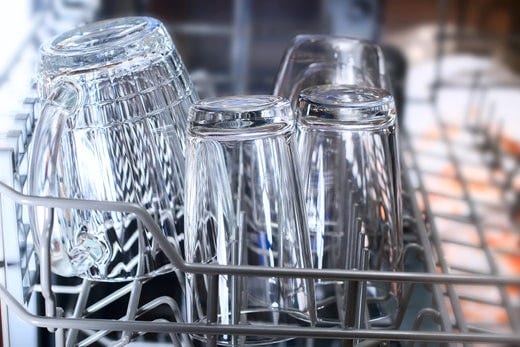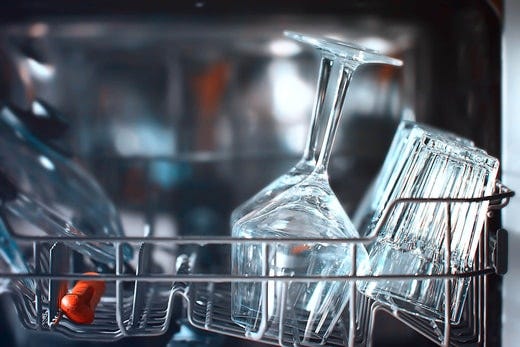
Is Tupperware Safe for Dishwashers?
Tupperware is a name brand. However, it is used as a broad term and refers to every plastic storage food container, regardless of its brand name. Today, some prefer glass storage containers over plastic for food (given their health and environmental benefits). But Tupperware continues to be popular. It is durable, easy to transport, and light on your pocket.

Is Tupperware dishwasher safe? Yes. Most dishwasher-safe Tupperware products are labelled as safe. You will find a symbol on them that determines their safety. But if Tupperware does not explicitly state it as dishwasher safe, you must wash it by hand.
Regardless, taking care of the plastic containers is vital for them to last a long time. Studies suggest plastic products can last almost ten years. However, you must clean, maintain, and store them properly. Experts advise against putting Tupperware in the dishwasher. But the newer Tupperware products can endure the moisture and heat of the dishwasher.
So, is it okay to put Tupperware in the dishwasher?
Read to find out.
Understanding Tupperware Materials
Tupperware can be made from various materials, each with different dishwasher safety levels. Common materials include:
- Plastic: This is the most common material, known for its versatility and durability. Most modern Tupperware made from high-quality plastic is dishwasher safe.
- Silicone: Often used in seals or lids, silicone is flexible, heat-resistant, and generally safe for dishwashers.
- Glass: Some Tupperware products come with glass bases, paired with plastic or silicone lids. Glass itself is dishwasher safe, but the same may not always apply to the lids.
Is All Tupperware Dishwasher Safe?
The simple answer is no, not all Tupperware is dishwasher safe. However, most Tupperware made today is designed to withstand the conditions inside dishwashers. Always check the bottom of the container for a dishwasher-safe symbol to confirm whether it's safe to wash in the machine.
In South Africa, where many families rely on Tupperware for meal storage and food transport, it’s important to check for this symbol, especially when buying imported or older products. If there’s no symbol, it’s safer to handwash the container to avoid potential damage.
Common Symbols for Dishwasher Safety:
- Dishwasher Safe: A symbol that looks like a box with plates or water droplets, often with dots or lines indicating water.
- Top Rack Only: This symbol indicates that the Tupperware should be placed on the top rack, where it’s further from the heating element.
Imported Tupperware brands may sometimes lack clear labelling, making it more difficult to know if they are dishwasher safe. In such cases, when in doubt, always opt for handwashing.
How to Protect Your Tupperware in the Dishwasher?
Even if your Tupperware is labelled as dishwasher safe, it’s still important to follow certain guidelines to avoid premature damage:
- Use the Top Rack: Always place Tupperware on the top rack. The heat from the dishwasher’s bottom can cause the plastic to warp or melt.
- Lower Heat Settings: Use a gentle cycle or eco-setting to reduce the exposure to heat. This not only protects your Tupperware but also saves energy—a major concern for many South African households dealing with rising electricity costs.
- Monitor for Warping: Even dishwasher-safe Tupperware can sometimes warp under intense heat. If you notice this happening, consider handwashing future loads.
BPA and Older Tupperware
Many households reuse Tupperware for years, but it's important to be cautious with older items. Prior to 2010, Tupperware sometimes contained BPA (Bisphenol A), a chemical that could leach into food when exposed to heat, potentially causing health issues.
If you have older Tupperware, especially those passed down through the family, it's best to avoid using them in the dishwasher or microwave. BPA-free Tupperware is now widely available, and it's safer for both your health and your food storage needs.
Caring for Tupperware
Tupperware is used in a variety of ways—ranging from school lunches to large family gatherings. Given the high usage, proper care is essential to prolong its lifespan. Here are some care tips tailored for South African households:
- Pre-rinse Stained Containers: South African dishes, like curries and tomato-based stews, can leave stains on Tupperware. Pre-rinse these containers before putting them in the dishwasher to reduce the risk of staining.
- Separate Lids and Bases: Lids, especially those with silicone or rubber seals, may degrade faster than the base. Always remove lids before putting Tupperware in the dishwasher and handwash them separately if necessary.
- Avoid Harsh Detergents: Strong detergents can degrade the plastic or silicone used in Tupperware. Use mild detergents to ensure your containers last longer.
Tupperware in Daily Use
Tupperware isn't just for leftovers. Many households use it for meal prep, school lunches, and even catering small events. Given the heavy use of Tupperware, dishwasher safety becomes a critical concern, especially in busy homes where saving time is a priority.
South African homes are also conscious of energy use, with many opting for eco-friendly settings on dishwashers. Using a lower temperature not only helps protect your Tupperware but also aligns with the broader effort to conserve energy in the country.
What to Do if Your Tupperware Warps?
Despite your best efforts, there may be times when Tupperware warps in the dishwasher. If this happens, here’s what you can do:
- Reshape the Container: If your Tupperware warps, try reshaping it while it’s still warm. Most plastics become more flexible under heat and can be moulded back into shape with gentle pressure.
- Switch to Handwashing: If warping occurs regularly, consider handwashing your Tupperware in the future. This is especially important for older containers that may not handle the heat as well.
Conclusion: Is Tupperware Safe for Dishwashers?
In conclusion, most modern Tupperware is safe for the dishwasher, as long as you follow a few key precautions. Check for the dishwasher-safe symbol, place your containers on the top rack, and avoid high-heat settings. For older Tupperware or those made before BPA regulations, it's best to handwash to prevent health risks.
For households, where Tupperware is an essential part of daily life, these care tips will help ensure your containers last for many years. Whether you’re storing leftovers, meal prepping, or packing school lunches, maintaining your Tupperware properly will ensure it remains a reliable part of your kitchen.
By following these simple steps, you can keep your Tupperware in good condition, avoid damage, and reduce the need for frequent replacements.
References:
- https://dishwasherusa.com/can-tupperware-go-in-dishwasher/
- https://utopia.org/guide/is-tupperware-dishwasher-safe-just-check-this-1-thing/
- https://www.housedigest.com/1111336/how-to-tell-if-your-tupperware-is-dishwasher-safe/
- https://houseandhomeonline.com/is-tupperware-dishwasher-safe/
- https://reviewed.usatoday.com/dishwashers/features/once-and-for-all-can-you-put-tupperware-in-the-dishwasher


